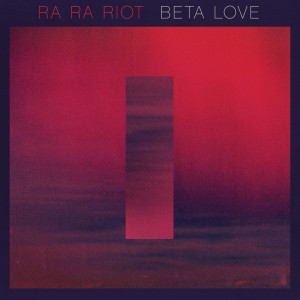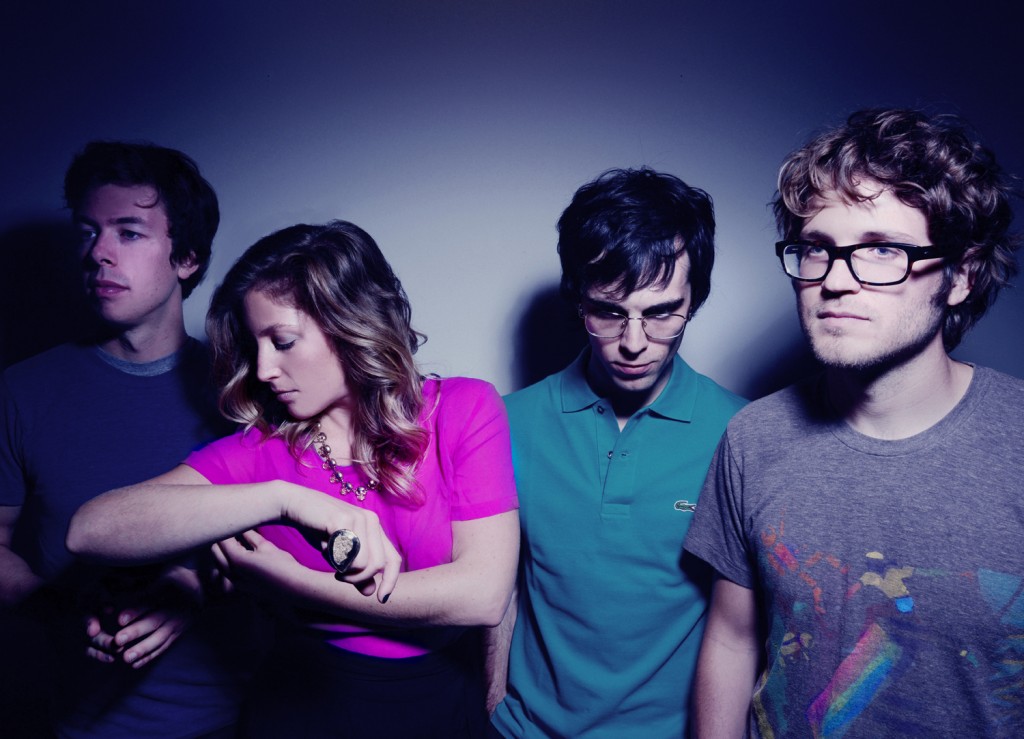Album Review: Ra Ra Riot – 'Beta Love'
posted in: Pop • Reviews & Playlists • Rock
 In 2001, the romance of technology was still lighthearted. For Daft Punk, erstwhile pioneers in the world of mainstream electronica, the technologies that propelled their “Digital Love” single to success in the new millennium “ the soft synths and sampled wurlitzers “ still weren’t at odds with human affection, human love, human communication. They were an addendum, a side note to human intimacy, which still had supremacy even in an age of gradually encroaching machines that would slowly command more time, love, and money than many interpersonal relationships. That time was still to come, though. At the turn of the millennium, America was reeling from other wounds, and the crush of technology was really not a concern.
In 2001, the romance of technology was still lighthearted. For Daft Punk, erstwhile pioneers in the world of mainstream electronica, the technologies that propelled their “Digital Love” single to success in the new millennium “ the soft synths and sampled wurlitzers “ still weren’t at odds with human affection, human love, human communication. They were an addendum, a side note to human intimacy, which still had supremacy even in an age of gradually encroaching machines that would slowly command more time, love, and money than many interpersonal relationships. That time was still to come, though. At the turn of the millennium, America was reeling from other wounds, and the crush of technology was really not a concern.
Twelve years later, Ra Ra Riot’s Beta Love tells a different story. That is not to say that the album is dark and despondent. While its 11 shimmering synth pop tracks do contain passing moments of dissonance, the overall impression is bright, buoyant, and energetic. Yet, there is something hollow about this energy. Reverb is noticeably absent from the majority of the tracks. Synths barely decay after they sound, and the vocals have a dry feeling of stark immediacy, nakedly pushed to the front of the mix. More than half of the songs on the album are under three minutes, and the rest barely break that mark. Incongruous sections are juxtaposed through often jarring transitions, and some songs never seem to reach a satisfying conclusion.
From a first listen, Ra Ra Riot’s new album comes off as a prisoner of the new age of technology and instant, digitally-mediated interaction. After all, the band can barely manage to sustain a musical idea past the meagre three-minute mark, and their songs flow in schizophrenic patterns “ note: “What I Do For U” “ that don’t adhere to the harmonic and organizational structures of traditional pop tunes. Ra Ra Riot come off as a child with ADD: simply unable to focus on what is expected of them as musicians channeling the sounds of more mainstream “indie” bands.
 But such a dismissiveness is unfair. It’s unlikely that the band named their album Beta Love “ evoking the losing contender in the video format wars of the late ’70s “ without an understanding of the implications of that term, and it quickly becomes clear that the immediacy of the vocal mix, the lack of reverb, the desultory transitions, and bite-size run time of the songs can be understood in service of a larger message: “Digital Love” no longer exists. What has replaced it is a more disquieting perversion of technology’s influence on human romance, and the failure of both to meet on common ground. On “That Much,” vocalist Wes Miles sings, “The whole Earth / Oh, in a little box / A window I can learn from.” While the Internet simultaneously opens up one world of information and interaction, it necessarily closes another. “There’s no room for the day / I just don’t want too many friends,” he continues. Amid the bit-crushed synths and chirping sine waves of “Binary Mind,” Miles sings, “This body that I own / It’s got no use anymore / ¦ / I need this binary mind / So I can forget how lonely it feels.” That is the paradoxical promise of the Internet: while it allows people to instantly connect with others around the world, that connection is only desirable insofar as it alleviates the inherent atomization of modern life that the Internet itself has occasioned. Technology is both the cure and the disease.
But such a dismissiveness is unfair. It’s unlikely that the band named their album Beta Love “ evoking the losing contender in the video format wars of the late ’70s “ without an understanding of the implications of that term, and it quickly becomes clear that the immediacy of the vocal mix, the lack of reverb, the desultory transitions, and bite-size run time of the songs can be understood in service of a larger message: “Digital Love” no longer exists. What has replaced it is a more disquieting perversion of technology’s influence on human romance, and the failure of both to meet on common ground. On “That Much,” vocalist Wes Miles sings, “The whole Earth / Oh, in a little box / A window I can learn from.” While the Internet simultaneously opens up one world of information and interaction, it necessarily closes another. “There’s no room for the day / I just don’t want too many friends,” he continues. Amid the bit-crushed synths and chirping sine waves of “Binary Mind,” Miles sings, “This body that I own / It’s got no use anymore / ¦ / I need this binary mind / So I can forget how lonely it feels.” That is the paradoxical promise of the Internet: while it allows people to instantly connect with others around the world, that connection is only desirable insofar as it alleviates the inherent atomization of modern life that the Internet itself has occasioned. Technology is both the cure and the disease.
Earlier this month, the New York Times ran a piece on the plight of romantic pursuit in the digital age. Entitled “The End of Courtship?” the article laid bare its premise in stark relief: budding romance among young twentysomethings is not much more than serif letters blinking on backlit screens and lonely, late-night Facebook browsing. All of which is, of course, patently unromantic. But even if twentysomethings understand what the pre-Internet romantic landscape once looked like, do they even care, or are they too inured to the impersonality of digital interaction to pine for, or see any value in, an era that they never really experienced? On Beta Love, Ra Ra Riot have an answer. “Who wants a human love / A death trap / A suicide club?” Miles asks on the closing track “I Shut Off.”
“I do,” he sings.
More like this:
